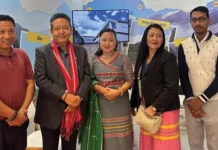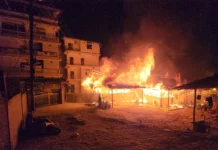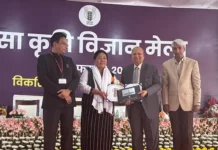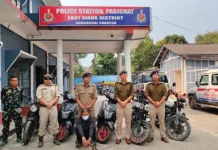[ Indu Chukhu ]
ITANAGAR, 28 Apr: Governor KT Parnaik has called for in-depth review and mapping of children with special needs (CwSN) in the state to bring out an impactful policy for them.
He said this while participating in an ‘Awareness and Observation of Autism Month’ programme at the state banquet hall here on Monday.
The governor, who inaugurated the programme along with Social Justice Minister Kento Jini, also suggested ensuring “proper and full implementation of inclusive education across all schools in the state by mandatory appointment of special educators, particularly during the early, formative years of a child’s schooling.”
“This event should be the beginning of our amplified understanding and celebration of neurodiversity, while committing to building a more inclusive world for everyone on the autism spectrum,” he said.
Referring to autistic children as the “shining stars” Arunachal Pradesh, he highlighted the importance of embracing their unique talents, focus, and attention to detail. He called on everyone to listen to autistic voices, learn from their experiences, and work toward ensuring equal opportunities across education, employment, and social participation.
The governor assured the parents that the state government would address their challenges and “go beyond the normal means.”
He said also that, as the chancellor of the universities in the state, he would initiate a PhD subject on autism, which would be useful in addressing theneurodiversity challenge.
Parnaik emphasised on conducting intensive sensitisation programmes for all stakeholder departments, especially the Education, Health, Social Justice, and Women and Child Development. He emphasised that the frontline workers in these departments must be trained and encouraged to actively reduce stigma and foster a more inclusive, supportive environment for these children and their families.
He also suggested exploring the possibility of establishing government-run “model special schools,” while recommending that the Health and Social Justice Departments work together to standardise the private centres and bring them under the umbrella of welfare programmes provided by the state and central governments. “This support would help ensure that therapy services are accessible, affordable, and of a high standard for all children who need them,” he said.
The governor commended the rehabilitation centre-cum-special schools and officials of the Health Services Directorate for their selfless service vis-à-vis the needs of individuals, providing support, guidance, and hope to those struggling with autism. He also commended Arunachal Pradesh State Commission for Protection of Child Rights (APSCPCR) Chairperson Ratan Anya for her painstaking effort to pursue the issue at the state level.
Jini in his address highlighted the responsibilities towards the CwSNs, and assured the parents that “all central and state government schemes or programmes to address autism, and other benefits for the children with special needs, will reach every household in the state.”
The governor, along with Jini, distributed teaching and learning kits, and aids and appliances to children with special needs. They also interacted with the parents and their autistic children, educators and medical specialists, and caretakers of rehabilitation and special centres.
The two-day programme is being organised by the APSCPCR, in collaboration with the state Health Department, the National Institute of Locomotor Disabilities, and the Toko Rehabilitation Centre-cum-Special School.
A large number of parents and their wards from the capital region participated in the programme. The highlight of the programme was a free disability assessment camp for children with special needs and registration for future consultations and records.
APSCPCR Chairperson Ratan Anya and APSCPCR Member Secretary Khoda Rakhi highlighted children affected by autism and recommended steps to address the issue.
Anya said that it is time to celebrate the unique talents, contributions, and identities of autistic individuals, “recognising that autism is a beautiful part of the spectrum of human diversity.”
“As part of our commitment to inclusion, we are organising this free disability assessment camp with the aim of ensuring that children receive proper evaluation and are issued disability certificates and unique disability identity (UDID) cards,” she said, adding that “many children do not have access to proper disability assessment, and as a result, they miss out on critical government services and support systems.”
She highlighted how timely and accurate assessments can greatly aid children, especially those on the autism spectrum disorders (ASD), and lead to major improvement in communication, behaviour, and learning.
She also stressed on the need for an inclusive education system, and suggested drawing a roadmap for a need-based policy for CwSNs.
In spite of special educators having been appointed under the Samagra Shiksha Abhiyan, their numbers are inadequate in the state, she noted.
“Currently there is only one state government-aided special school – that is the Donyi Polo Mission School for the Hearing and Visually Impaired, Itanagar.
There is no provision yet for children with autism, intellectual disabilities and remaining categories of disabilities,” Anya said.
She also requested the government to consider establishing “model special schools” under the Deen Dayal Divyangjan Rehabilitation Scheme in every district.
On the inaugural day, a total of 94 CwSNs underwent assessment for UDID cards and disability certificates.
A parent of an autistic child said, “Often, our children in the autism spectrum disorders are excluded and even denied admission in schools, depriving them of their basic right to education.”
The parent reflected on the acute shortage of trained special educators, especially at the primary level in both government and private schools.
She said, “Presence of special educators will not only ensure proper care for these children; it will also create an inclusive environment and sensitise the school authorities, other parents and society at large. These children need our help and attention, not only at homes and therapy sessions but also in schools.”
Highlighting the inadequate infrastructure for children with autism in the state, the parent said that the lack of government-run special schools and centres for CwSNs means that many families,especially of economically weaker section, are left with little to no option.
“While there are a few private un-aided institutions, many families are unable to afford their fees. Furthermore, there is an urgent need for a framework on which such institutions should be run, with an overseeing body to ensure its proper implementation,” said the parent. (With input from Raj Bhavan)





